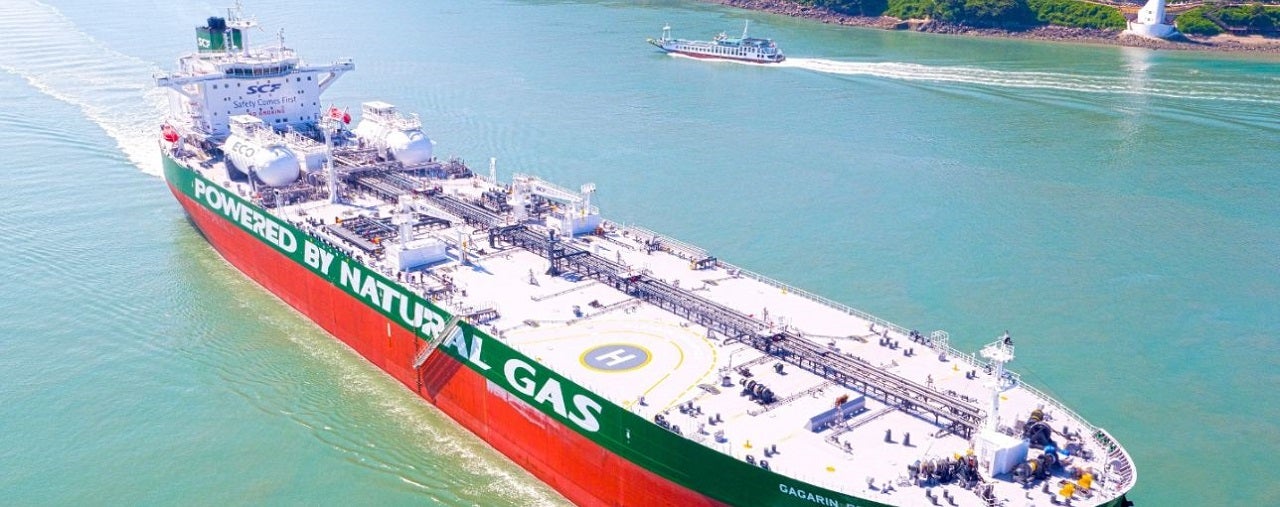
Classification society DNV GL and shipbuilder HHI Group have presented results of a new joint research that is focused on the development of modern future-proof tanker designs.
At the ‘Green Tankers towards 2050’ industry webinar, which was attended by over 250 participants from shipping firms around the globe, DNV GL and HHI Group stated that the eco-friendly marine solutions will help managers and shipowners to cope with firmer environmental guidelines
In 2019, a memorandum of understanding (MOU) was signed at Gastech trade fair in Houston, for the joint research to develop low and zero carbon solutions for marine transportation.
The outcomes of the MOU were presented by lead researchers from HHI Group companies, Korea Shipbuilding & Offshore Engineering (KSOE), Hyundai Heavy Industries (HHI) and Hyundai Mipo Dockyard (HMD), in virtual platform, which was co-hosted by DNV GL from its headquarters in Høvik, Norway.
HHI Group COO and SEVP Seong-Yong Park said: “Shipowners are faced with many uncertainties in the rapidly changing marketplace. We believe our research results, including proven engineering solutions and alternative fuels, will support them in developing their future strategy for ship operations and fleet renewal.”
During the webinar, DNV GL and HHI Group professionals explained the recent development in regulations with regard to the greenhouse gas emissions from ships.
How well do you really know your competitors?
Access the most comprehensive Company Profiles on the market, powered by GlobalData. Save hours of research. Gain competitive edge.

Thank you!
Your download email will arrive shortly
Not ready to buy yet? Download a free sample
We are confident about the unique quality of our Company Profiles. However, we want you to make the most beneficial decision for your business, so we offer a free sample that you can download by submitting the below form
By GlobalDataFurthermore, the design index for existing vessels (EEXI) and a new Carbon Intensity Indicator, which are due to enter into force in 2023, were also detailed to the participants.
HHI Group stated that in response to the changing regulations, it introduced its eco-friendly vessels that are fitted with alternative fuel technologies and energy-reducing arrangements.
Around 40 LNG dual-fuelled vessels have already been delivered or are under construction by HHI.
With the application of DNV GL’s data-based carbon robust model to its very large crude carrier (VLCC) and Medium Range (MR) tanker vessels, HHI Group noted that an LNG fuel propulsion system along with advanced energy saving devices (ESDs) can assist a ship to meet the new Carbon Intensity Indicator over its estimated lifetime.
DNV GL Maritime business development manager Christos Chryssakis said: “Since ESDs mainly have an impact on fuel consumption during sailing, the benefits are greater for large vessels such as VLCCs, which spend more days operating at sea.
“These ships are also less sensitive to price variations when it comes to selection of LNG as fuel. This is because the capital expenditures are paid back faster due to a higher fuel consumption.”
Chryssakis added that for smaller ships with lower fuel consumption, a higher price differential between very low sulphur oil (VLSFO) and LNG was needed to pay back the initial investment, thereby making these ships more sensitive to volatile fuel prices.
DNV GL Maritime senior vice president business development Trond Hodne said: “We have no clear vision yet of the zero-carbon ship in deep sea shipping. As we work hard towards the zero emission vessel, the industry also needs to make newbuilding decisions today. Thus, we should not make perfect the enemy of good.
“As demonstrated by HHI Group and our experts, we have energy efficient designs and technologies at hand that will enable ships to meet the IMO emission trajectories through their entire lifetime. These highly efficient vessels are likely to be attractive to charterers and investors today, and even more so if CO2 will have a cost.”







